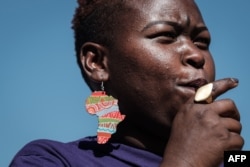Hundreds of Kenyan women and activists took to the streets of Nairobi and Mombasa on Friday, marching against gender-based violence and the lack of punishment for its perpetrators.
The demonstrators, many wearing white T-shirts and purple and red ribbons, called on the government to develop an action plan to prevent violence against women.
"There is a war against our bodies, there is a war against Kenyan women and together we are raising our voices to say no to this femicide and violence against women," said Renoh Amollo, a human rights activist took part in the march. "No consequences befall these perpetrators. We note that violence against women has been normalized and, therefore, escalating because of the systemic power structures that favor men."
According to local media reports, between 10 and 20 women in Kenya have been murdered in acts of gender-based violence in 2019.
Four years ago, the government set up an affirmative action fund to help vulnerable groups such as women, persons with disabilities and the elderly. Esther Passaris, a Kenyan legislator, used some of the money to fund Friday's march.
"The initiative started almost two weeks ago with social media, and then later on today we have lent them support through the affirmative action fund. Why have we done that? We have a vote that says let's protect the woman, let's empower her economically, let's speak to gender-based violence," Passaris said.
Last month, a human rights activist was reported missing and her body was found in a city mortuary. Pathologists and police reports concluded that Carol Mwatha died as a result of a backstreet abortion, but some rights groups have linked her death to her investigation of extrajudicial killings by police.
Hussein Khalid, the director of human rights organization Haki Africa, says Kenya must do a better job at preventing these kinds of attacks.
"We are here today to stand together because we know in Kenya, violence against women, femicide has been on the rise. So we are here to call for the rights of women and we are standing together with our women to say that we cannot allow femicide in this country. Any society that does not respect its women is an uncivilized society," Khalid said.
According to a United Nations Office on Drugs and Crime report, nearly 70 percent of all women intentionally killed in Africa in 2017 were killed by intimate partners or other family members. The report indicated that little progress has been made in preventing such murders.





